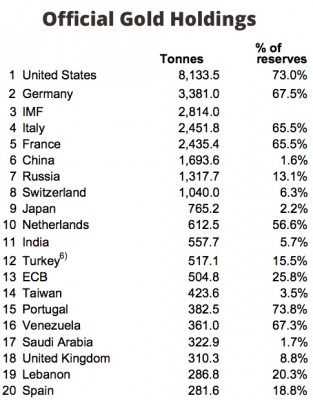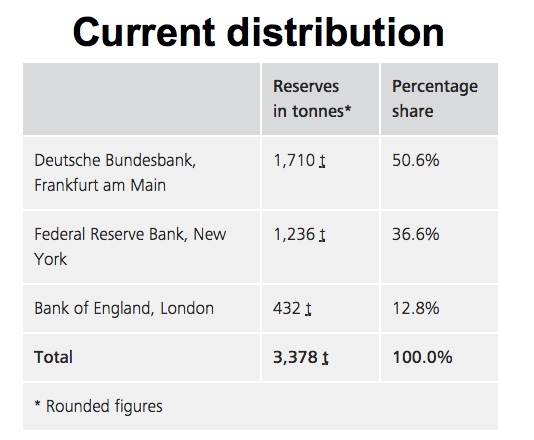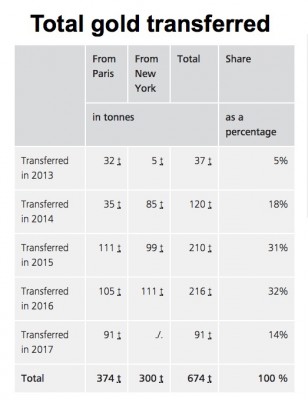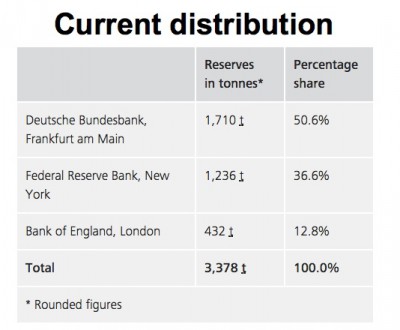TonyGosling
Editor


Joined: 25 Jul 2005
Posts: 18335
Location: St. Pauls, Bristol, England
|
 Posted: Sun Sep 03, 2017 10:15 pm Post subject: Bundesbank demands repatriation of gold from U.S. Posted: Sun Sep 03, 2017 10:15 pm Post subject: Bundesbank demands repatriation of gold from U.S. |
 |
|
Bundesbank Repatriation of Gold From U.S.
http://news.goldseek.com/GoldSeek/1503666074.php
-- Published: Friday, 25 August 2017
– Bundesbank has completed a transfer of gold worth €24B from France and U.S.
– Germany has completed domestic gold storage plan 3 years ahead of schedule
– In the €7.7 million plan, 54,000 gold bars were shipped and audited
– In 2012 German court called for inspection of Germany’s foreign gold holdings
– Decision to repatriate from Paris and New York was ‘to build trust and confidence domestically’
– 1,236t or 37% of German holdings remain in New York Fed facility
– Bundesbank wants to hold gold bullion
– U.S. government declines to audit gold reserves … doesn’t want world to realise gold’s importance in the global monetary system
Editor: Mark O’Byrne
Last Monday, U.S. Treasury Secretary Mnuchin feigned to inspect the U.S. gold reserves in Fort Knox and joked flippantly that he assumed it was there.
A day later the Bundesbank, announced that they had repatriated much of their gold reserves from the U.S. and France. Coincidence or coordination?
In 2013 the Deutsche Bundesbank announced plans to store half of its gold reserves in Germany. At the time, only 31% was stored in the country. The Gold Storage Plan involved bringing gold home from both Paris and New York.
The plan was expected to take seven years. At the time many asked why it would take so long to return just 674t of gold. The Bundesbank has completed the plan three years ahead of schedule.
The German gold repatriation was in response to the critics and or in order to safeguard the German gold reserves and ensure they are owned in a safe, allocated and segregated manner by the Bundesbank.
In the last five years the German central bank has 374t and 300t from Paris and New York, respectively. The Bundesbank opted to keep 432t in the Bank of England vaults.
Whilst the tables above (from the Bundesbank) show the repatriation of gold was ultimately successful, it has promoted much discussion about the security of gold in central banks.
The decision to move the gold back to home soil has also vindicated many who have long argued about the murky gold reserve dealings of the United States.
Why was the gold abroad and why move it?
Many countries choose to hold proportions of their gold on foreign soil for both security and practical reasons.
Practical reasons as it makes sense to have reserves in diversified locations so you have access to markets should you need to trade the reserves.
In 2013 a Bundesbank spokesman said “we have no intention to sell gold” adding that the decision to relocate the foreign held gold “is in case of a currency crisis.”
This leads on to security reasons. During the Cold War the Bundesbank wanted to keep its gold in the West in case of an invasion from the Soviet Union. It was also a way of supporting the country’s currency knowing there were reserves held securely abroad, should the country need to use them.
Campaigns and concerns in the last decade have made the German population and central bank rethink what the modern security and practical threats are, prompting them to bring some of the gold home.
It was in the wake of the U.S. subprime crisis, the Lehman collapse and then the ensuing eurozone and global debt crisis in 2012, that prompted voices in Germany to call for an audit of the precious metal held abroad.
Campaigners also suspected the gold might have been tampered with or not be fully allocated and non leased. In response to the calls for greater transparency the Bundesbank agreed to hold 50% of the gold in Germany.
When the Bundesbank announced their plans to keep 50% of the gold at home it came just three months after they had defended their reasons for keeping the gold on foreign soil:
‘To function as reserve assets, it would have to be possible for the gold holdings to be exchanged, if necessary, into a commonly used reserve currency without any logistical constraints. That is the reason for storing parts of the gold reserves at partner central banks in other countries.’
Then, in early 2013 the central bank announced:
‘By 2020, the Bundesbank intends to store half of Germany’s gold reserves in its own vaults in Germany. The other half will remain in storage at its partner central banks in New York and London. With this new storage plan, the Bundesbank is focusing on the two primary functions of the gold reserves: to build trust and confidence domestically, and the ability to exchange gold for foreign currencies at gold trading centres abroad within a short space of time.’
It is also worth mentioning that in 2012 the German Court of Auditors ordered an audit of the gold reserves. The court clearly wanted to ensure that the nearly 3,400 tons of gold existed – ‘because stocks have never been checked for authenticity and weight‘.
Why were the Germans worried about the safety of their gold?
Few people have raised eyebrows about Germany’s decision to bring gold back from Paris. The Bundesbank gave the following reason for doing so:
‘Given that France, like Germany, also has the euro as its national currency, the Bundesbank is no longer dependent on Paris as a financial centre in which to exchange gold for an international reserve currency should the need arise. As capacity has now become available in the Bundesbank’s own vaults in Germany, the gold stocks can now be relocated from Paris to Frankfurt.’
However, no specific reason was given for the US, other than the need to ‘build trust and confidence domestically.’
The announcement by the Bundesbank to move 300t of gold from New York sent ripples through the gold community. Many wondered if the plan was expected to take seven years because New York did not have Germany’s gold. Was this where the need to build trust and confidence came from?
More recently, with the election of President Trump, there might have been more cause for concern when it comes to the safety of a country’s gold.
“We have a lot of discussions about (U.S. President Donald) Trump, regarding implications on monetary policy, macroeconomics, etc., but we trust the central bank of the U.S.,” Bundesbank board member Carl-Ludwig Thiele told a news conference in February of this year. But, “Trump has not triggered a discussion about the storage facility in New York.”
The Gold Anti-Trust Action Committee (GATA) and Germany’s homegrown ‘Repatriate our Gold’ movement have been the loudest voices when it comes to concerns over the existence of gold and the nature of that gold’s ownership in the US Treasury’s possession.
In 2017 Sputnik News reported on the successful repatriation of Germany’s gold from the US. In the report, a Russian commentator suggested Germany had received the wrong gold.
Russian economist Vladimir Katasonov, a professor at the International Finance Department at the Moscow State Institute of International Relations, told Sputnik that the U.S. had not been ready to give the bullion back. The professor suggested Germany’s gold bars had been disposed of at the United States’ own discretion.
“There are a lot of signs that the gold was not physically present in the New York vaults when Germany called it back. Of course, the U.S. began to return it to Germany but there is one interesting detail. When you leave your suitcase in the luggage storage, you expect to get back the same suitcase. But Germany took the wrong ‘suitcase,'” Katasonov told Radio Sputnik.
According to the economist, the gold bars that Bundesbank repatriated have different labels. He suggested that the U.S. might have replaced the German bullion with different gold bars bought from the market.
Katasonov explained that the U.S. managed to return the yellow metal thanks to favorable conditions in the precious metal market.
“I think there was a favorable environment in the market and the Americans managed to quickly buy the gold and give it back to Germany. They were not ready for this, but finally managed this replacement,” he concluded.
It is worth mentioning that Carl-Ludwig Thiele told journalists that there were no issues with the gold received, ”We’ve checked every ingot against authenticity, fineness, and weight. We have nothing to complain about.”
Why did it take so long?
The Banca d’Italia, the Bundesbank and the International Monetary Fund make up the three largest gold holders at the New York Federal Reserve. Together they account for over 4,000 tonnes.
However, there has not been (to our) knowledge an audit to confirm that this is the case. There is no evidence these holdings have changed or been audited since the 1970s.
When it came to the 374t to be repatriated from New York many asked ‘If you have the gold why would you not just return it all in one ago, straight away?’ Why was it expected to take seven years? Previously Germany had repatriated 940 tons of its gold from the Bank of England without delays.
Theories abound as to why this could not happen. But they all centre around the theory that the gold is not there or if it is it may have two or more owners in gold leasing arrangements.
This is something we briefly mentioned earlier in the week. The move to repatriate the gold to Germany was partly driven by rumours that much of the gold held offshore may have been “rehypothecated” as suggested by GATA.
In fact, the US has appeared to have repatriated all of the requested gold to Germany three years ahead of schedule.
If the gold not been in the vaults then the US would have had to buy the gold or unravel gold leasing contracts.
Was there reason to be concerned?
Earlier this week we reported on the US Treasury Secretary’s visit to Fort Knox. His jokes about the existence of the gold prompted much coverage about the debate surrounding this very issue.
In response, respected commentator Jim Rickards argued that ‘all the evidence tells me that the gold is in Fort Knox and at West Point.’
‘Let me say it right now: Yes, the gold is there. I actually have some evidence that the gold is there from military sources.’
Now, some people like billionaire precious metals trader Eric Sprott argue that the gold could very well be at Fort Knox, but it’s been leased out to commercial banks. And yes, it could very well be leased. But leasing is a paper transaction. It doesn’t mean the government surrenders possession of the gold.
And what about the lack of audit?
If you are the Fed or the Treasury and you want people to think that gold is unimportant — which they do — why would you audit it?
You audit things that are important. You do not audit things that are unimportant. If the Fed doesn’t want you to think that gold is important, it follows that they would not audit it. Auditing it pays gold too much respect.
I am in favor of an audit, just to be clear. But the fact that the government does not audit the gold does not tell you that the gold is not there. They just do not want you to pay any attention to it.
Audit or no audit, gold or no gold, the fact is the Germans felt the need to bring back some of their gold.
Conclusion: Protect your gold
The move by the Bundesbank was a prudent one, whether there was ever any real cause for concern or not. The fact is the US may well have all the gold that was ever stored there, or they may not.
It is also true that the eurozone is near breaking point and the continent is increasingly under threat from various geopolitical forces. It makes sense to have the gold in a place where they can audit and access it.
When you own gold you should expect to have access to it whenever you so wish. You should not expect others to have access to it and you should certainly expect to receive regular reports on its existence, security and your outright ownership of individual coins and bars that can be taken delivery of with a phone call.
All reports suggest that this was not the case.
It suits the majority of countries to avoid pushing the debate on the existence of gold holdings. Should a country like the US be unable to meet requirements when Germany demands its gold back in one go then it could place the two major world currencies (USD and Euro) at risk. The whole world would wonder what farce had been going on all this time.
However, Germany clearly wanted their gold back because of concerns about both how the US were looking after it and the future of global stability both politically and financially.
Individual investors should take the same approach. The main lesson of note here is that central banks want to own gold. They see it as the ultimate safe haven. Because of this Germany want to hold it in a segregated and allocated manner. Luckily for savers, that secure bullion storage option is readily available.
Related Content
Germany to Review Bundesbank Gold Reserves in Frankfurt, Paris, London and Federal Reserve Bank of New York
Bundesbank Announces Repatriation of 120 Tonnes of Gold from Paris and New York Federal Reserve
Bundesbank “Reassures” Re. Gold Bullion Reserves as Deutsche Bank Shocks With €6 Billion Loss Warning
News and Commentary
Gold steady ahead of central bank speeches at Jackson Hole (Reuters.com)
Gold price remains dull on futures correction (DailyTimes.com.pk)
Gold settles lower as investors look to Jackson Hole (MarketWatch.com)
U.S. Stocks Fluctuate Before Yellen; Oil Declines (Bloomberg.com)
Dixons Carphone Plunges as Mobile Slowdown Leads to Warning (Bloomberg.com)
Gold’s out performance of S&P500 in 10 years – Bloomberg via Stansberrychurchouse.com
Gold outperforms US stocks in 10 years since financial crisis (Stansberrychurchouse.com)
U.S. stocks haven’t been this extreme since 1929 and 2000 (MarketWatch.com)
Did The Economy Just Stumble Off A Cliff? (ZeroHedge.com)
Epsilon Theory: Always Go To the Funeral (EpsilonTheory.com)
Jackson Hole: Yellen to play safe and not warn of asset bubbles (MoneyWeek.com)
Gold Prices (LBMA AM)
25 Aug: USD 1,287.05, GBP 1,003.90 & EUR 1,090.90 per ounce
24 Aug: USD 1,285.90, GBP 1,003.26 & EUR 1,090.44 per ounce
23 Aug: USD 1,286.45, GBP 1,004.33 & EUR 1,091.68 per ounce
22 Aug: USD 1,285.10, GBP 1,000.71 & EUR 1,091.95 per ounce
21 Aug: USD 1,287.60, GBP 999.82 & EUR 1,096.52 per ounce
18 Aug: USD 1,295.25, GBP 1,004.34 & EUR 1,102.65 per ounce
17 Aug: USD 1,285.90, GBP 998.12 & EUR 1,096.74 per ounce
Silver Prices (LBMA)
25 Aug: USD 17.02, GBP 13.26 & EUR 14.40 per ounce
24 Aug: USD 16.93, GBP 13.20 & EUR 14.36 per ounce
23 Aug: USD 17.06, GBP 13.32 & EUR 14.48 per ounce
22 Aug: USD 17.02, GBP 13.27 & EUR 14.48 per ounce
21 Aug: USD 17.02, GBP 13.20 & EUR 14.48 per ounce
18 Aug: USD 17.15, GBP 13.30 & EUR 14.60 per ounce
17 Aug: USD 17.02, GBP 13.23 & EUR 14.55 per ounce
http://www.goldcore.com/us/
_________________
www.lawyerscommitteefor9-11inquiry.org
www.rethink911.org
www.patriotsquestion911.com
www.actorsandartistsfor911truth.org
www.mediafor911truth.org
www.pilotsfor911truth.org
www.mp911truth.org
www.ae911truth.org
www.rl911truth.org
www.stj911.org
www.v911t.org
www.thisweek.org.uk
www.abolishwar.org.uk
www.elementary.org.uk
www.radio4all.net/index.php/contributor/2149
http://utangente.free.fr/2003/media2003.pdf
"The maintenance of secrets acts like a psychic poison which alienates the possessor from the community" Carl Jung
https://37.220.108.147/members/www.bilderberg.org/phpBB2/ |
|
TonyGosling
Editor


Joined: 25 Jul 2005
Posts: 18335
Location: St. Pauls, Bristol, England
|
 Posted: Sun Sep 03, 2017 10:17 pm Post subject: Posted: Sun Sep 03, 2017 10:17 pm Post subject: |
 |
|
US still holds $54 billion of Germany's gold
Frik Els | Oct. 9, 2015, 4:02 PM | 11,190 | 8
http://www.mining.com/us-still-holds-54-billion-of-germanys-gold/

The Bundesbank this week issued an exhaustive list of every last of the 270,316 gold bars it has stored in vaults around the world on behalf of the German nation.
The 2,300-page document revealed the detail and location of each of the bars, together containing 3,384,227.7893 kilograms or 108,805,421.213 troy ounces of gold worth just under $126 billion at today's price.
That place the European country second only to the US in terms of its official gold reserves. The central bank also said it will be updating the list on an annual basis henceforth.
While the information may assuage some of the bank's critics who've been skeptical of the existence of the bullion, those campaigning for the repatriation of Germany's gold from vaults in the US, England and France will see little progress has been made in this regard.
In January 2013 Germany's central bank, the Bundesbank, said it will ship back home all 374 tonnes it had stored with the Banque de France in Paris, as well as 300 tonnes held in Manhattan by the US Federal Reserve, by 2020.
33 months later and Buba, as the Federal Bank of Germany is often called, is not very far down this road. Paris still holds 308 tonnes, the 439 tonnes of bullion held by the Bank of England is staying put and the Fed is still sitting on 1,451 tonnes or 43% of the total.
In May 2013 year Austria, perhaps unnerved by Germany's experience with their bullion and mindful of Brown's Bottom, sent a team of auditors to check on gold held by the Bank of England.
Only 17% of Austria's 280 tonnes of gold reserves are held inside the European nation with the Bank of England holding the bulk or some 150 tonnes worth more than $6.2 billion.
Other nations have been more successful in their repatriation efforts.
In November last year, the Dutch central bank has secretly brought 120 tonnes of gold, valued at nearly $5 billion, of the European nation's gold reserves held in New York back to Amsterdam.
In November 2011, Venezuela repatriated some 180 tonnes of gold held in vaults in London and elsewhere to store it with the Caracas central bank under orders from late President Hugo Chavez.
US still holds $54 billion of Germany's gold
Source: World Gold Council – October 2015
| Description: |
|
| Filesize: |
251.68 KB |
| Viewed: |
306 Time(s) |

|
_________________
www.lawyerscommitteefor9-11inquiry.org
www.rethink911.org
www.patriotsquestion911.com
www.actorsandartistsfor911truth.org
www.mediafor911truth.org
www.pilotsfor911truth.org
www.mp911truth.org
www.ae911truth.org
www.rl911truth.org
www.stj911.org
www.v911t.org
www.thisweek.org.uk
www.abolishwar.org.uk
www.elementary.org.uk
www.radio4all.net/index.php/contributor/2149
http://utangente.free.fr/2003/media2003.pdf
"The maintenance of secrets acts like a psychic poison which alienates the possessor from the community" Carl Jung
https://37.220.108.147/members/www.bilderberg.org/phpBB2/ |
|
TonyGosling
Editor


Joined: 25 Jul 2005
Posts: 18335
Location: St. Pauls, Bristol, England
|
 Posted: Sun Sep 03, 2017 10:29 pm Post subject: Posted: Sun Sep 03, 2017 10:29 pm Post subject: |
 |
|
Germany brings home $28bn worth of gold reserves
Repatriation of 54,000 gold bars was completed three years ahead of schedule.
Cecilia Jamasmie | Aug. 23, 2017, 5:32 AM | 5,075 | 114
http://www.mining.com/germany-brings-home-28bn-worth-gold-reserves-ear lier-expected
Germany brings home $28bn worth of gold reserves
Much of Germany's gold reserve is back in Frankfurt. (Image courtesy of Bundesbank.)
Germany’s central bank completed Wednesday its plan to bring back home 54,000 gold bars it had in vaults located in New York and Paris to beneath its Frankfurt headquarters, three years ahead of schedule.
The Bundesbank, one of the world’s top bullion holders, secretly repatriated 674 tonnes from the vaults of the Federal Reserve Bank of New York and Banque de France, the French central bank, over the past four years in one of the biggest operations of its type.
"Germany's central bank now holds half of the country’s gold"
Each of the 53,780 bars weighs 12.5kg and is worth about $520,000 (€440,000). In total, the haul is worth €23.7 billion ($28bn) and its arrival means that just over half of all Bundesbank gold is now stored in its own vaults in Frankfurt.
The lender said it “thoroughly and exhaustively” tested all of the bars after they arrived back in Frankfurt and “no irregularities came to light with regard to the authenticity, fineness or weight of the bars.”

Germany brings home $28bn worth of gold reserves
Source: Bundesbank.
Germany began building most of its gold holdings in the 1950s, when trade surpluses were exchanged for gold under the Bretton Woods system that linked the US dollar to the precious metal. That led to a build-up of gold in vaults overseas, especially in New York, under the Federal Reserve.
During the Cold War the Bundesbank wanted to keep its gold in the west in case of an invasion from the Soviet Union.

Germany brings home $28bn worth of gold reserves
Source: Bundesbank.
But at the height of the Eurozone crisis in 2012, the German public grew uneasy about keeping their gold abroad and the central bank yield to pressure began shipping its gold back.
Not all of the Bundesbank gold reserves are now in Germany. A big chunk — 1,236 tonnes — will remain in New York indefinitely, the bank said. A smaller portion, 432 tonnes, will be held at the Bank of England, in London.
| Description: |
|
| Filesize: |
56.7 KB |
| Viewed: |
299 Time(s) |

|
| Description: |
|
| Filesize: |
52.23 KB |
| Viewed: |
295 Time(s) |

|
_________________
www.lawyerscommitteefor9-11inquiry.org
www.rethink911.org
www.patriotsquestion911.com
www.actorsandartistsfor911truth.org
www.mediafor911truth.org
www.pilotsfor911truth.org
www.mp911truth.org
www.ae911truth.org
www.rl911truth.org
www.stj911.org
www.v911t.org
www.thisweek.org.uk
www.abolishwar.org.uk
www.elementary.org.uk
www.radio4all.net/index.php/contributor/2149
http://utangente.free.fr/2003/media2003.pdf
"The maintenance of secrets acts like a psychic poison which alienates the possessor from the community" Carl Jung
https://37.220.108.147/members/www.bilderberg.org/phpBB2/ |
|




